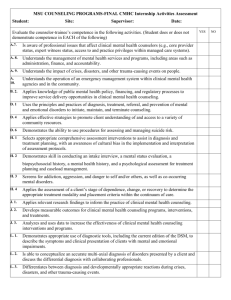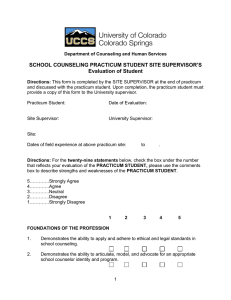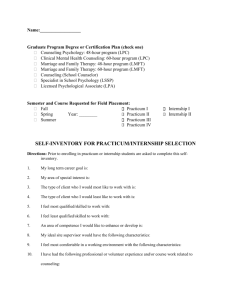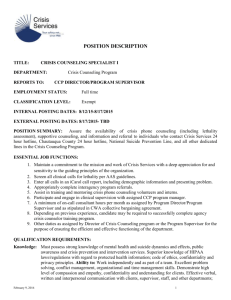CMHC Practicum Site Supervisor Evaulation
advertisement
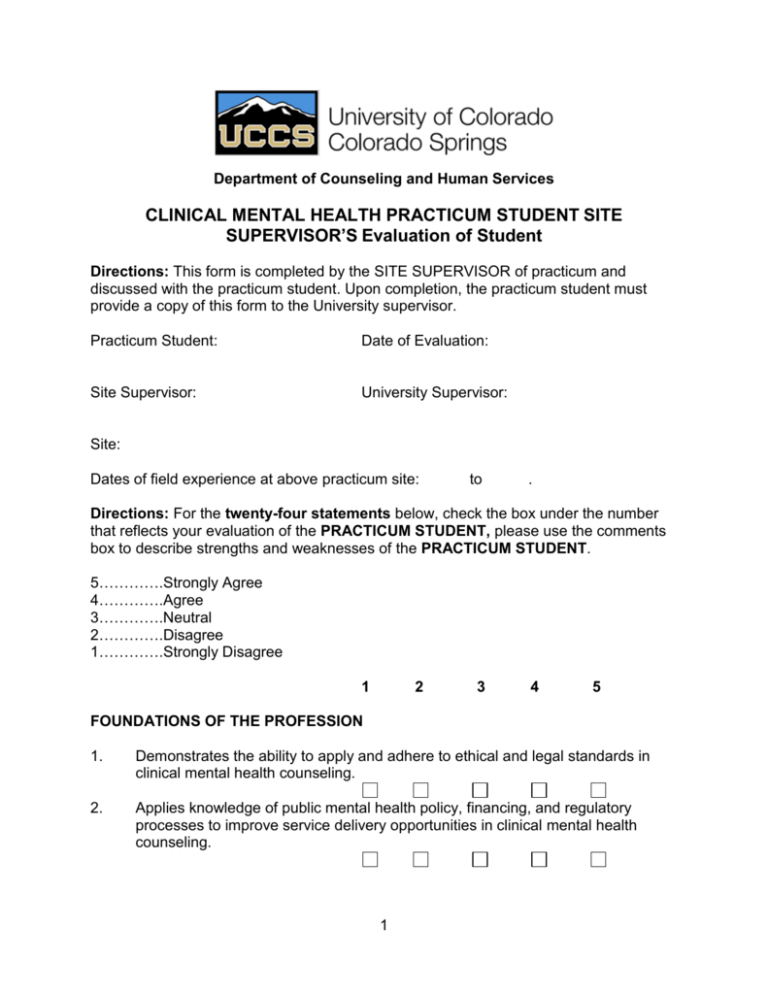
Department of Counseling and Human Services CLINICAL MENTAL HEALTH PRACTICUM STUDENT SITE SUPERVISOR’S Evaluation of Student Directions: This form is completed by the SITE SUPERVISOR of practicum and discussed with the practicum student. Upon completion, the practicum student must provide a copy of this form to the University supervisor. Practicum Student: Date of Evaluation: Site Supervisor: University Supervisor: Site: Dates of field experience at above practicum site: to . Directions: For the twenty-four statements below, check the box under the number that reflects your evaluation of the PRACTICUM STUDENT, please use the comments box to describe strengths and weaknesses of the PRACTICUM STUDENT. 5………….Strongly Agree 4………….Agree 3………….Neutral 2………….Disagree 1………….Strongly Disagree 1 2 3 4 5 FOUNDATIONS OF THE PROFESSION 1. Demonstrates the ability to apply and adhere to ethical and legal standards in clinical mental health counseling. 2. Applies knowledge of public mental health policy, financing, and regulatory processes to improve service delivery opportunities in clinical mental health counseling. 1 COUNSELING, PREVENTION AND INTERVENTION 3. Uses the principles and practices of diagnosis, treatment, referral, and prevention of mental and emotional disorders to initiate, maintain, and terminate counseling. 4. Applies multicultural competencies to clinical mental health counseling involving case conceptualization, diagnosis, treatment, referral, and prevention of mental and emotional disorders. 5. Promotes optimal human development, wellness, and mental health through prevention, education, and advocacy activities. 6. Applies effective strategies to promote client understanding of and access to a variety of community resources. 7. Demonstrates appropriate use of culturally responsive individual, couple, family, group, and systems modalities for initiating, maintaining, and terminating counseling. 8. Demonstrates the ability to use procedures for assessing and managing suicide risk. 9. Applies current record-keeping standards related to clinical mental health counseling. 10. Provides appropriate counseling strategies when working with clients with addiction and co-occurring disorders. 11. Demonstrates the ability to recognize his or her own limitations as a clinical mental health counselor and to seek supervision or refer clients when appropriate. DIVERSITY AND ADVOCACY 12. Maintains information regarding community resources to make appropriate referrals. 13. Advocates for policies, programs, and services that are equitable and responsive to the unique needs of clients. 14. Demonstrates the ability to modify counseling systems, theories, techniques, and interventions to make them culturally appropriate for diverse populations. 2 ASSESSMENT 15. Selects appropriate comprehensive assessment interventions to assist in diagnosis and treatment planning, with an awareness of cultural bias in the implementation and interpretation of assessment protocols. 16. Demonstrates skill in conducting an intake interview, a mental status evaluation, a biopsychosocial history, a mental health history, and a psychological assessment for treatment planning and caseload management. 17. Screens for addiction, aggression, and danger to self and/or others, as well as co occurring mental disorders. 18. Applies the assessment of a client’s stage of dependence, change, or recovery to determine the appropriate treatment modality and placement criteria within the continuum of care. RESEARCH 19. Applies relevant research findings to inform the practice of clinical mental health counseling. 20. Develops measurable outcomes for clinical mental health counseling programs, interventions, and treatments. 21. Analyzes and uses data to increase the effectiveness of clinical mental health counseling interventions and programs. DIAGNOSIS 22. Demonstrates appropriate use of diagnostic tools, including the current edition of the DSM, to describe the symptoms and clinical presentation of clients with mental and emotional impairments. 23. Is able to conceptualize an accurate multi-axial diagnosis of disorders presented by a client and discuss the differential diagnosis with collaborating professionals. 24. Differentiates between diagnosis and developmentally appropriate reactions during crises, disasters, and other trauma-causing events. COMMENTS: 3 Signatures: __________________________________________________________ Site Supervisor Signature Date __________________________________________________________ Practicum Student Signature Date __________________________________________________________ University Supervisor Signature Date 4
